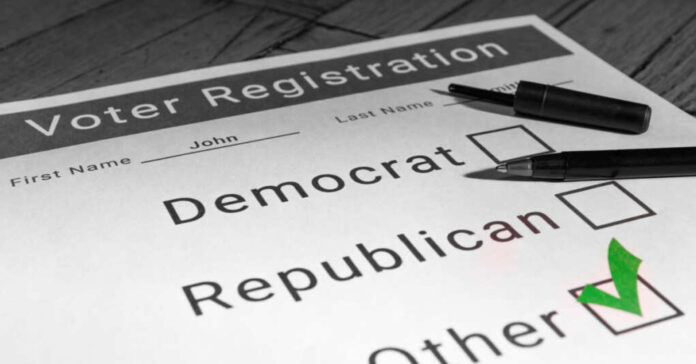
Recently, former House Speaker Nancy Pelosi (D-CA) joined a growing list of prominent Democrats to sound the panic alarm for the possible emergence of a third-party candidate from No Labels.
No Labels is attempting to gain ballot access nationwide, with the goal of assembling a unified ticket led by both a Republican and a Democrat. They have not revealed who these candidates might be, although rumors are swirling after Senator Joe Manchin teased a third-party bid for the White House and Robert F. Kennedy Jr. tossed his third-party presidential hat into the political arena.
RFK Jr. is, in fact, more of a threat to both Democrats and Republicans than either party expected. Kennedy, a former Democrat, is running as a “spoiler” candidate with support from both GOP, Democrat and politically unaffiliated individuals, making him an unpredictable wildcard to the established parties.
Concerns are rising among Republicans as well as Democrats. Republicans are attempting to characterize Kennedy as a “typical Democrat,” suggesting they are uneasy about his appeal to GOP voters. Meanwhile, Democrats are terrified of a repeat of 2016, when self-proclaimed Democrat socialist Senator Bernie Sanders (I-VT) drew considerable voter support from front-runner Hillary Clinton and arguably cost her the White House.
During a recent breakfast event hosted by the Democratic-centrist group Third Way, Pelosi went off on an unhinged and thoroughly untruthful tirade against No Labels, giving them a label of her own. “No Labels is perilous to our democracy,” she told reporters. “I hesitate to say No Labels because they do have labels. They’re called no taxes for the rich. No child tax credit for children. They’re called let’s undo the Affordable Care Act.”
Pelosi has largely ignored No Labels, even when they threatened her position as House Speaker, until now. She told reporters that, “When they jeopardize the reelection of Joe Biden as president of the United States, I can no longer remain silent.”
A third-party candidate might cost President Joe Biden his reelection bid, but they might cost Republicans an outright victory as well. This is the scenario that frightens Democrats even more than the possibility of the candidate siphoning votes from Biden..
A successful No Labels candidate could potentially win just enough electoral college votes from both parties to prevent a majority victory for either side. In this case, congressional delegations, currently holding a Republican majority, would decide the presidential election.
A Third-party candidate, while unlikely to win the White House, can hand the presidency to Republicans in a neat little package with a bow on top. If neither presidential party nominee secures enough electoral votes to win the presidency, the U.S. Constitution provides a process for determining the winner. The House of Representatives then decides the presidential election, with each state delegation casting one vote for one of the top three candidates. The Senate, on the other hand, chooses the Vice President.
In the House of Representatives, each state delegation has one vote, and the majority of states (at least twenty-six out of fifty) is required to win. This process is outlined in the 12th Amendment to the U.S. Constitution.
Currently, Republicans have control of the House of Representatives, along with the majority of states necessary to ensure a GOP victory in 2024.
The 2024 election is poised to be a rematch between two wildly unpopular candidates. Like 2016, Americans will be forced to cast a vote to choose against a candidate rather than in support of the opposing candidate, But this election cycle, there is a significant interest in a third-party candidate as a referendum against both Biden and former president and GOP frontrunner Donald Trump. Trump.
According to RealClear politics, voters hold negative views of both Biden and Trump. Currently, Biden holds an unfavorable rating of 55%, and Trump’s unfavorable rating stands at 56%. That means that over half of all voters are not fully supporting either candidate, or they are expressing a “neither party” appetite for a third-party win.
MAGA backers might abandon the Trump camp, while Biden’s supporters question his ability to serve a second term. The emergence of even a moderately successful third-party candidate could either draw some voters directly from Biden, as Democrats worry or attract enough support from both sides to potentially tip the electoral power toward the House of Representatives, an even bigger Democrat concern.
Either way, a third-party candidate could potentially be the Democrats’ worst nightmare and a dream come true for the GOP.






